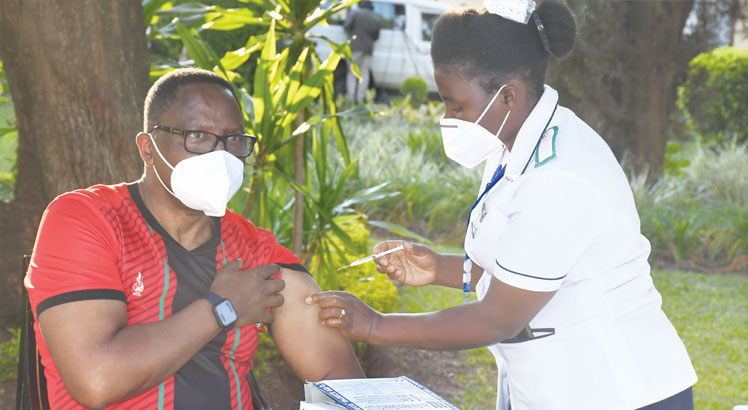Mixed views on 60% Covid jabs target
Despite low uptake of Covid-19 vaccines, Ministry of Health (MoH) is optimistic that it will achieve the target to vaccinate 60 percent of the population by December 2022.
But public health experts have cast doubt that the target would be achieved, noting that since March when the country rolled out the vaccines, only 2.3 percent of the population has so far been vaccinated. This means. that on average, only 0.35 percent of the population is vaccinated monthly
Besides the 60 percent target by December 2022, MoH has also set an ambitious 20 percent target of the population to be vaccinated by December this year.
In an interview on Saturday, MoH spokesperson Adrian Chikumbe admitted that meeting the target will likely be a challenge due to a number of reasons.

But he said: “By December 2022, we are expecting to reach the target. It is a target set by the World Health Organisation [WHO] for the African region.
“The minimum target for most vaccines is 80 percent, but this would be a tall order for a couple of understandable reasons. These include limited supplies [from high demand] and high costs of the vaccines.”
To increase uptake of the vaccine, Chikumbe said the ministry is rolling out a ‘taking vaccines to the people’ strategy, apart from working with councils and other partners to sustain correct messages to the public.
He said the ministry would also continue
orienting and updating other stakeholders, including the media and faith leaders on disseminating correct messages pertaining to the vaccines.
But in a separate interview, Malawi University of Science and Technology (Must) microbiologist Gama Bandawe said based on the rate at which people are vaccinating, it is obvious that it will be hard to reach the target.
He said: “What is important is that the nation must be brought into an understanding why vaccination is important and how it’s going to help us.“We know of the economic impact that Covid-19 has had and I think it’s important for us to see what the figures are, what the impact is and what the impact will be going forward for having a population that’s not vaccinated.”
Bandawe said one of the challenges is the information deficit on vaccine importance and misinformation which needs to be challenged in a big way.
He said the absence of relevant information and misinformation on the other hand is derailing progress of the vaccination exercise.
In a separate interview, epidemiologist Titus Divala
said the vaccine targets are not only too ambitious but also not supported by disease risk profile.
He said with such broad targets, the ministry risks being inefficient in its approach and may fail to reach the most critical part of the vaccination programme in ensuring that all individuals at highest risk of severe disease or death are reached.
“Given our limited resources and poor uptake, our aim should be about investing all we have in the vaccine programme on these vulnerable people first and then expand later,” Divala said.
He said this is the only approach that can give Malawi the opportunity to fully benefit from the vaccines by nearly eliminating hospitalisations and deaths, which is the goal of the vaccines.
On his part, Kamuzu University of Health Sciences professor of epidemiology Adamson Muula said the 60 percent target should continue to be our standard while fearing that such an ambitious target may not be reached.
He said: “It seems to me that we need to engage extra gears in mobilising our different communities.”
But Chikumbe expressed optimism that with their new strategy of taking vaccines to the people, they may improve on uptake.
According to data from the Public Health Institute of Malawi (Phim), as of Saturday a total of 909 438 vaccines had been administered.
The country has so far received a total of 1 409 440 assorted vaccines that have been provided by the Covax Facility, which is a global initiative intended to secure equitable access to vaccines.
It is led by the WHO and supported by partners such as the Global Alliance for Vaccines and Immunisation (Gavi) and the Coalition for Epidemic Preparedness Innovations (Cepi) and United Nations Children’s Fund (Unicef).
Meanwhile, the country is also expecting to receive an additional 360 000 doses of the AstraZeneca vaccines and 372 doses of the Pfizer vaccines by month end.





